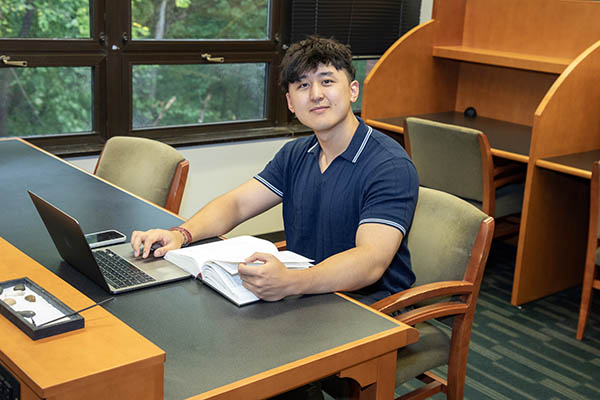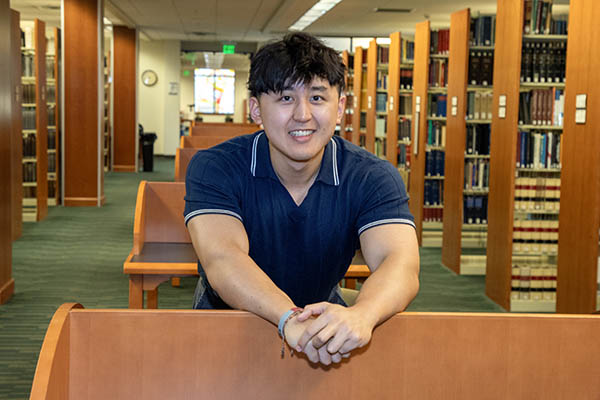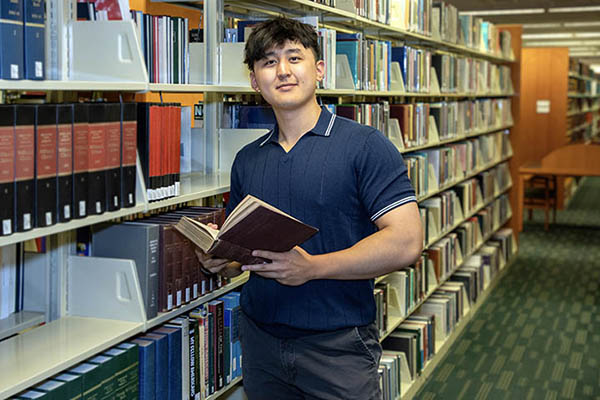Mitigating Risks: Ao (Leo) Li ’27 Explores the Intersection of Business and Law
Business, in particular entrepreneurship, has always been important to Ao (Leo) Li. And with a B.S. in business administration and a minor in computer science he has the educational credentials to back that up. But he felt that something was missing in the equation.
Something like knowledge of the law.
“When I studied at the Questrom School of Business at Boston University, I was required to take a class named ‘Intro to Business Law,’” Li says. “This class sparked my interest in law because I started to understand the legal implications of each personal decision, such as signing a contract, suing for damages, and settling a conflict.”
After an unsuccessful entrepreneurship attempt, Li realized the importance of using legal tools to mitigate business risks, and he started to explore the intersection between business and law. Post graduation, he was fortunate to land a legal assistant position with a small firm in Vienna, Va., before attending law school.
“While my duty as a legal assistant was mostly administrative, I had several chances to manage client relationships and proofread legal documents,” Li says. “All these experiences reaffirmed my interest in pursuing a legal degree where I can best utilize my skillset in the legal field and assist other entrepreneurs or businesspersons like I once was.”
 Li was born in Chengdu, China (the “home of the pandas,” he is quick to point out), and came to the United States for high school when he was 15. He spent four years in a private Christian School in New Jersey before attending Boston University.
Li was born in Chengdu, China (the “home of the pandas,” he is quick to point out), and came to the United States for high school when he was 15. He spent four years in a private Christian School in New Jersey before attending Boston University.
And now that he is in Williamsburg, Li hopes to add new perspectives as an international student from Asia.
“I experienced a cultural shock when I first came to the United States in high school, partly because I had great difficulty expressing and sharing how different views can exist for reasons one might not think of,” Li says. “Law school gives me a venue to express my unique takes on many complicated legal issues, such as privacy vs personal safety, due process and civil rights, and so on.”
Legal ethics are also important to Li, and he is glad of William & Mary’s emphasis on minting lawyers who maintain a professional standard of conduct.
“My interaction with the Admission staff and information I received from independent research convinced me that William & Mary Law cares about the characteristics and ethics of its students,” he says. “Rather than addressing the numbers game of bar passage rate and employment rate, which William & Mary is undoubtedly also good at, I was impressed by the various initiatives William & Mary Law undertook under Dean Spencer—such as ‘Why We Can't Wait.’ I deeply resonate with William & Mary’s values and vision.”
Li also resonates with the Law School’s use of technology, and plans to put his computer science background to work with the Center for Legal & Court Technology. He would also like to participate in the Christian Legal Society, exploring how he can strengthen his faith and bring more kindness and love to others when pursuing a legal education. His other interests include weightlifting and, increasingly, tennis.
Li believes that being a lawyer requires incredible knowledge and professional skills, but additional responsibility comes with the territory.
“Being a citizen lawyer also means that I should keep a kind and mindful heart towards people around me,” Li says. “Many graduate studies and advanced schooling are for self-betterment, but being a lawyer means we ought to be of service to other people; that is why I think of a Citizen Lawyer as someone who is highly ethical and kind-hearted.”
After law school, Li would like to work as a corporate law attorney or an in-house counsel, preferably with startups. He think many startup companies have great visions for their services and products, but lack sufficient legal resources to safeguard their endeavors.
“Without understanding the legal implications of some important steps when building a business, one is bound to many detrimental risks,” he explains. “I would like to help as many businesspeople to succeed without being deprived of their rights in the process.”
But that is still in the future, and Li has three years of intense preparation ahead of him. It’s a journey he is undertaking with vigor.
“I am looking forward to acquiring many new skills, including thinking and analyzing problems logically, expressing my thoughts coherently, and communicating with other people with confidence,” Li says. “Meanwhile, I am also looking forward to being a student again, where I can make mistakes and correct myself to become better at what I study.”